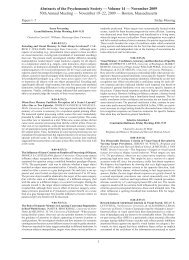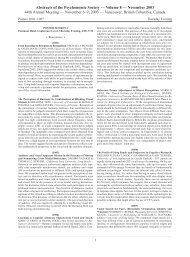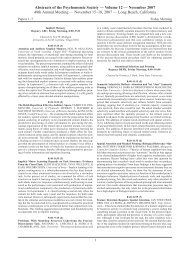Abstracts 2005 - The Psychonomic Society
Abstracts 2005 - The Psychonomic Society
Abstracts 2005 - The Psychonomic Society
Create successful ePaper yourself
Turn your PDF publications into a flip-book with our unique Google optimized e-Paper software.
Papers 34–40 Friday Morning<br />
9:40–9:55 (34)<br />
Different Strategies Used for Recognizing Different-Race Faces.<br />
MICHAEL B. LEWIS, Cardiff University (sponsored by Dylan Marc<br />
Jones)—Other-race faces are harder to recognize than own-race faces,<br />
but increased contact with people of the other race can reduce this<br />
own-race bias. Two explanations for these effects are considered.<br />
First, people employ the same strategy for processing own-race and<br />
other-race faces, but this strategy is tuned to own-race faces. Second,<br />
different strategies are employed for own-race and other-race faces,<br />
and the strategy for own-race faces is superior. An experiment measured<br />
recognition performance for the internal features of faces that<br />
had been learned with external features that made the face look like<br />
either an own-race face or an other-race face. Accuracy was greater<br />
when the face had been learned as an own-race face, suggesting that<br />
different encoding strategies are employed for different-race faces.<br />
One implication of this research is that race affects the perception of<br />
an individual even before the face has been fully encoded.<br />
SYMPOSIUM: Applying Cognition to Education<br />
Grand Ballroom Centre, Friday Morning, 10:00–11:50<br />
Chaired by Mark A. McDaniel, Washington University<br />
10:00–10:05 (35)<br />
Symposium I: Applying Cognition to Education Intro. MARK A.<br />
MCDANIEL, Washington University, & AYANNA K. THOMAS, Colby<br />
College—E. L. Thorndike envisioned a future in which educational<br />
practices in teaching would be guided by a psychological theory of<br />
learning. Unfortunately, research in cognitive psychology has had little<br />
influence on education, an area to which cognition psychology<br />
should be well positioned to contribute. However, influential cognitive<br />
psychologists are beginning to foreground educational concerns<br />
in their research, with this work appearing in our flagship journals<br />
(e.g., JEP:LMC, January <strong>2005</strong>). <strong>The</strong> proposed symposium will provide<br />
a forum to present and stimulate this developing trend in the<br />
field. Researchers who have been on the cutting edge of cognitive psychology<br />
research will present new research that orients basic cognitive<br />
psychology research to educational issues. Research highlighted<br />
in this symposium will include how conditions of learning and testing<br />
can affect successful performance, whether feedback can improve<br />
memory, the consequences of producing incorrect answers, and<br />
whether meta-awareness of conditions of study and test affect monitoring<br />
and control.<br />
10:05–10:20 (36)<br />
Learning How to Learn: Experiencing the Outcome of Differential<br />
Encoding Strategies Enhances Subsequent Encoding. PATRICIA A.<br />
DEWINSTANLEY, Oberlin College, & ELIZABETH L. BJORK,<br />
UCLA—We investigated whether participants, given the opportunity to<br />
experience the differential memorial consequences of different encoding<br />
strategies—such as generating versus reading—would then change<br />
how they processed future to-be-learned material. Participants were<br />
able to profit from such an experience, but only if that experience was<br />
of a particular kind—namely, one that offered them the opportunity<br />
to experience the different consequences of alternative encoding<br />
strategies within a single test. Our findings suggest educational innovations<br />
that might lead students to adopt more effective processing<br />
strategies. <strong>The</strong>y are also consistent with metacognitive research indicating<br />
that learners can be insensitive to the effectiveness of certain<br />
learning-enhancing factors (e.g., Koriat & Bjork, in press) and are<br />
typically unable to judge the efficacy of a given processing strategy<br />
during its execution and do not switch from a less to a more effective<br />
strategy without an opportunity to experience their relative effectiveness<br />
(e.g., Dunlosky & Hertzog, 2000).<br />
10:20–10:35 (37)<br />
Zoning Out During Reading: An Underappreciated Source of<br />
Comprehension Failure. JONATHAN W. SCHOOLER, JONATHAN<br />
6<br />
SMALLWOOD, & MERRILL MCSPADDEN, University of British<br />
Columbia, & DAVID HALPERN & ERIK D. REICHLE, University of<br />
Pittsburgh—Considerable research has demonstrated that reading difficulties<br />
can stem from comprehension-monitoring failures. However,<br />
this research has largely overlooked the fact that people frequently fail<br />
to notice not only that they are having trouble understanding the text,<br />
but also that they are not even attending to what they are reading. This<br />
talk will introduce two paradigms that examine comprehension failures<br />
resulting from “zoning out” during reading. <strong>The</strong>se include (1) a<br />
self-report + experience sampling procedure that frequently “catches”<br />
participants zoning out during reading before they catch themselves<br />
and (2) a gibberish detection paradigm that demonstrates that when<br />
zoning out, participants regularly fail to notice that they are reading<br />
gibberish. Collectively, these studies indicate that zoning out is an important<br />
source of comprehension failure that is due, in part, to lapses<br />
in meta-awareness of the current contents of thought.<br />
10:35–10:50 (38)<br />
Working Memory, Math Performance, and Math Anxiety. MARK H.<br />
ASHCRAFT & JEREMY KRAUSE, University of Nevada, Las Vegas,<br />
& KELLY RIDLEY, Cleveland State University—<strong>The</strong> literature is<br />
very clear on the global consequences of mathematics anxiety. People<br />
who are highly math anxious avoid math: <strong>The</strong>y avoid elective<br />
coursework in math, both in high school and college, they avoid college<br />
majors that emphasize math, and they avoid career paths that involve<br />
math. We go beyond these psychometric relationships to examine<br />
the cognitive consequences of math anxiety. We show how<br />
performance on a standardized math achievement test varies as a function<br />
of math anxiety and how math performance depends on available<br />
working memory capacity, which varies inversely with math anxiety.<br />
High math anxiety corresponds closely to a dual-task setting; preoccupation<br />
with one’s math fears and anxieties functions exactly like a<br />
resource-demanding secondary task. We speculate on possible developmental<br />
and educational factors that contribute to the development<br />
of math anxiety.<br />
10:50–11:05 (39)<br />
Region of Proximal Learning. JANET METCALFE, Columbia University—In<br />
contrast to the view that people should study, first and<br />
longest, the items judged most difficult, we propose that people attempt<br />
to study within their own region of proximal learning. A model<br />
is proposed for how they do so. <strong>The</strong> model emphasizes two components:<br />
choice and perseverance, If people’s judgments of learning<br />
(JOLs) are sufficiently high that they believe they know the items already,<br />
they choose to not study. If they do choose to study, though, the<br />
order is from that which they believe is almost known to the more difficult<br />
(high JOL to low JOL). <strong>The</strong> decision of when to stop studying<br />
is determined by judgments of the rate of learning (jROLs). When<br />
learning is perceived to be proceeding quickly, they continue studying.<br />
When their subjective assessment indicates that learning is at a<br />
standstill, they stop. Research findings bearing on the region of proximal<br />
learning model will be reviewed.<br />
11:05–11:20 (40)<br />
<strong>The</strong> Negative Cascade of Incongruent Task–Test Processing in Memory<br />
and Metamemory. AYANNA K. THOMAS, Colby College, &<br />
MARK A. MCDANIEL, Washington University—<strong>The</strong> present study<br />
was conducted to examine the effects of the encoding–retrieval<br />
process interaction on metamemory for text. Previous research suggests<br />
that metamemory for text can improve when specific processing<br />
variables are manipulated. We expand on this idea by testing<br />
whether a match (or mismatch) between processes instantiated by<br />
study tasks and those instantiated by retrieval demands affect monitoring<br />
and subsequent implemented control strategies. In two experiments,<br />
participants were presented with expository texts and engaged<br />
in letter deletion, sentence sorting, or reading. After processing the<br />
passages, participants provided section-by-section judgments of<br />
learning (JOLs). Participants were then given either a detailed or a





